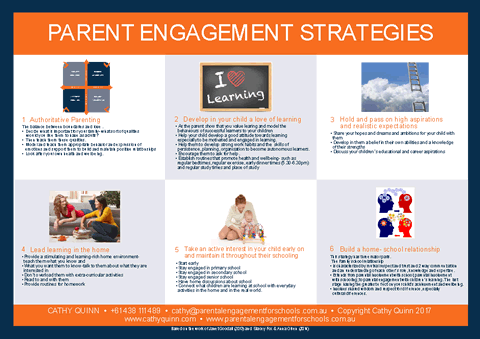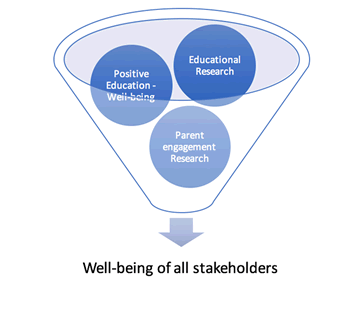So much is going on for teachers not only in changes to the curriculum which has implications for developing new skill sets for a lot of teachers. Focusing on developing more engaging tasks for students but also in their personal lives. Then there are the growing adversarial relations with parents. An us and them attitude has developed between teachers and parents that needs to be addressed.
There is a call by educational theorists to focus on what makes a difference in the child’s academic achievement and what matters. What if teachers had a framework of what matters in parent engagement in their child’s learning and this was available for parents as well- A framework to guide teachers to focus on what are the most effective things that parents can do in the home to assist their child’s learning and wellbeing? Just as research by theorists such as Hattie and Marzano have outlined the high impact strategies for teaching and learning, research in the parent engagement area has refined what matters for parents to be engaged in their child’s learning. A distinction is made here between parent engagement in their child’s learning and parent involvement in the school in events such as tuckshop and fundraising volunteers. There are six effective strategies that parents can do in the home that has the greatest effect on their child’s learning and well-being. They do not need to be in the school and they don’t have to have any educational skills to do them.
Download PDF for free http://www.parentalengagementforschools.com.au/teachers-engagement-for-schools/
Literature in the well-being field suggests a strengths based approach to children’s learning and teachers’ well-being. This article attempts to fuse the literature in these three areas- education, well-being and parent engagement- that are sometimes disparate and operating in silos for the wellbeing of all in schools – parents, teachers and students. I argue that we need a strengths based approach to parents as well.
According to leading parent engagement researcher in USA, Karen Mapp, this will require a cultural change in both schools and the home and the dual capacity building of both teachers and parents. Karen suggests there will need to be a change in four beliefs.
- Every parent and teacher wants the best for the child: Teachers have entered teaching for the purpose of making a difference in the lives of children. Parents just want the best for their child and are just doing the best they can with the knowledge they have even if they are not in the school.
- Teachers make a difference in the classroom and parents make a difference in the home: Teachers make a difference in the achievement of children especially in the relationships they build with their students. Parents and teachers need to believe that what they do can make a difference. Teachers matter and so to do Parents matter. We are all in this together. We are working together to with the goal that all students can flourish into independent adults.
- Parents and Teachers both have skills to build on: Parents have skills and knowledge about their child that is not known by others and they engage with their child learning in the home already. Teachers expert knowledge based on their training and are knowledgeable about what is appropriate especially for the social and emotional development of the child.
- The responsibility for cultivating the environment for home school partnership rests with the school. Parenting doesn’t come with a manual but schools have access to such great information gathered at Positive Schools conferences and the like that would greatly benefit all parents if the school were able to develop the process conditions (Mapp & Knutter, 2013) needed for parental engagement. According to Mapp, communication to parents and events involving parents in the school are more effective for parent engagement in their child’s learning if they are
- Linked to learning- parents leave knowing more about what their child should know and be able to do- they see themselves playing a role in their child’s education (role construction)
- Relational – involves 2-way communication-parents have an opportunity to share their knowledge about their child
- Strengths based- parents are given a new tool/ strategy
- Collaborative- parents were able to work in groups with their peers
- Interactive- they had time to practice
How do the events held in your school rate against this?
For more information
www.parentalengagementforschools.com.au




